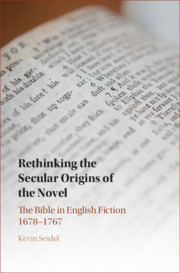Book contents
- Rethinking the Secular Origins of the Novel
- Rethinking the Secular Origins of the Novel
- Copyright page
- Contents
- Figures
- Tables
- Appendixes
- Acknowledgments
- Introduction
- Part I Rethinking the Secular at the Origins of the English Novel
- Part II Versions of Biblical Authority
- Part III Uses of Scripture for Fiction
- Chapter 6 Traveling Papers: Pilgrim’s Progress and the Book
- Chapter 7 Surprised by Providence: Robinson Crusoe as Defoe’s Theory of Fiction
- Chapter 8 Resilient to Narrative: Clarissa after Reading
- Chapter 9 Breaking Down Shame: Narrating Trauma and Repair in Tristram Shandy
- Conclusion
- Appendices
- Notes
- Works Cited
- Index
Chapter 6 - Traveling Papers: Pilgrim’s Progress and the Book
from Part III - Uses of Scripture for Fiction
Published online by Cambridge University Press: 16 March 2021
- Rethinking the Secular Origins of the Novel
- Rethinking the Secular Origins of the Novel
- Copyright page
- Contents
- Figures
- Tables
- Appendixes
- Acknowledgments
- Introduction
- Part I Rethinking the Secular at the Origins of the English Novel
- Part II Versions of Biblical Authority
- Part III Uses of Scripture for Fiction
- Chapter 6 Traveling Papers: Pilgrim’s Progress and the Book
- Chapter 7 Surprised by Providence: Robinson Crusoe as Defoe’s Theory of Fiction
- Chapter 8 Resilient to Narrative: Clarissa after Reading
- Chapter 9 Breaking Down Shame: Narrating Trauma and Repair in Tristram Shandy
- Conclusion
- Appendices
- Notes
- Works Cited
- Index
Summary
Chapter 6 traces the appearance of the Bible as a series of legal or forensic documents (book, scroll, certificate) in part one of Pilgrim’s Progress (1678) and then as a series of entertaining things (food, digestive, mirror) in part two (1684). The shift in appearance from legal document to entertaining thing shows Bunyan’s fiction moving through channels already carved out by the circulation of the scriptures in late-seventeenth-century England: a literary channel in which the Bible was held to be the supreme book of wisdom; a legal channel in which the Bible was used to justify state authority; and a domestic channel in which the Bible was used to speak the language of intimacy. This chapter also touches on writing about the Bible by John Locke, Thomas Jefferson, and Mary Rowlandson to show how Bunyan uses scripture not to imagine life-after-death in the Celestial City but life on the outskirts of that City, here in this world.
- Type
- Chapter
- Information
- Rethinking the Secular Origins of the NovelThe Bible in English Fiction 1678–1767, pp. 157 - 178Publisher: Cambridge University PressPrint publication year: 2021

